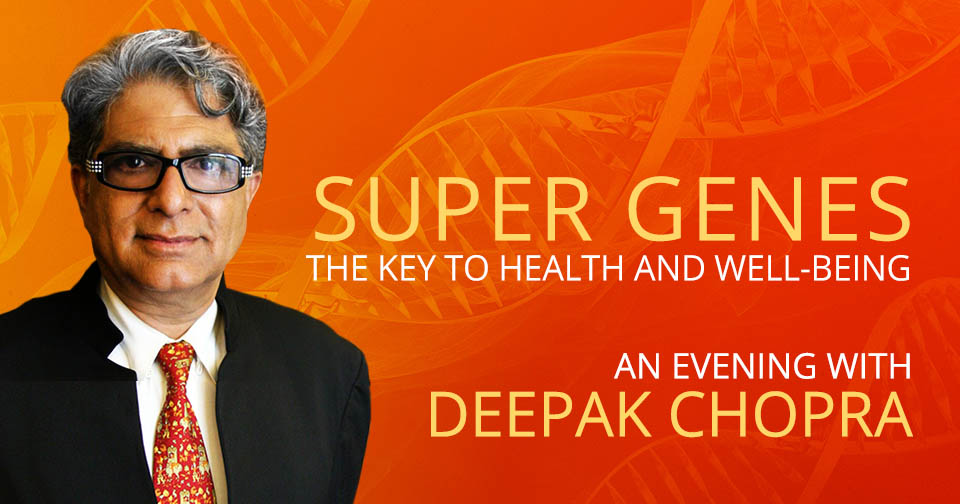
Deepak Chopra’s latest book, Super Genes, tells how lifestyle shifts can help you reboot your health at a genetic level.
DIET
- A typical modern diet is very likely to cause inflammation, which research has linked to many chronic diseases and obesity.
- To reduce inflammation, add prebiotics – substances that buffer the body from inflammation – such as oatmeal, pulpy orange juice, bran cereal and bananas to your breakfast.
- Consume probiotics – foods that contain active bacteria – once a day for gut health. These foods include active yoghurt, pickles and sauerkraut.
- Eat mindfully – eat only when you’re genuinely hungry and stop when you are full.
- Reduce snacking by eating only one measured portion in a bowl; never eat straight from a bag or packet.
- Three factors generally lie behind the problem of chronic stress: repetition, unpredictability and a lack of control. Think of a dog barking outside your window; you don’t know when it will end and you have no way of stopping it.
- Decrease background noise and distractions at work. Also, avoid multitasking by dealing with one thing at a time.
- Leave work on time at least three times a week and don’t bring work home. Leave the office at the office.
- Avoid people who are sources of pressure and conflict. Even normal office behaviour, such as forming cliques and gossiping, is a source of stress that has the potential to be emotionally devastating.
- If you struggle to deal with negative emotions, ask your doctor about cognitive behaviour therapy.
EXERCISE
- The secret to exercise is this: keep going and don’t stop. It’s better to be active all your life at a lower level, rather than to be at a near professional-level in high school, say, and then stop completely.
- At work get up and move around once an hour and devote half your lunch break to movement, even if it’s walking around the block.
- Be in nature more: go outside for five to 10 minutes three times a day.
- Acquire more active friends and join them in their activities. Plan a shared exercise activity with your spouse or friends twice a week.
- Make leisure time more creative – think beyond TV or internet.
- Volunteer to help the needy with housecleaning, painting and repairs.
This will serve as both exercise and a morale boost.
MEDITATION
- Meditate every day for 10 minutes.
Sit with your eyes closed in a quiet place, put your attention on the tip of your nose and focus on the sensation of your breath coming in and out of your nostrils.
- Don’t look at meditation as an aid for the bad days you experience (“I’m feeling good today, so I don’t need to meditate”). It should be a lifelong practice.
- Take 10 minutes out of your lunch break to sit alone with eyes closed, preferably outside in nature.
- Notice what a relief it is to take big deep breaths when you are upset or nervous, and how ragged your breath becomes when you are anxious or stressed.
- Join an organised meditation course in your area. Search for meetup.com to find local groups that meet all around the country.
SLEEP
- Make your bedroom as dark as possible. If total darkness is impossible, wear a sleep mask.
- Drink a glass of warm almond milk, which is rich in calcium and promotes melatonin, a hormone that helps to regulate the sleep-wake cycle.
- Experiment with herbal teas associated with good sleep such as chamomile, valerian, passionflower, lavender and kava kava.
- Explore abhyanga, a self-massage technique that uses warmed sesame oil, lightly massaged into arms, legs, neck and torso (go to YouTube to see tutorials).
- Don’t ignore insomnia. In some studies sleep disorders have been associated with triggering Alzheimer’s disease and are also associated with high blood pressure.
EMOTIONS
- Take responsibility for your feelings. Wellbeing depends upon happiness, yet most people don’t really make that connection.
- Write down five specific things that make you happy and, on a daily basis, do at least one of them.
- Set a “good news policy” at meal times, whether it’s the radio station you choose to listen to or the topic of conversation around the table.
- Explore a time in your past when you were happy and learn from it, whether that means re-embracing an old hobby or getting in touch with an old friend.
- Become comfortable with delayed gratification – consider how your choices will make you feel in the future as well as today.
Edited extract from Super Genes by Deepak Chopra and Rudolph E. Tanzi.
